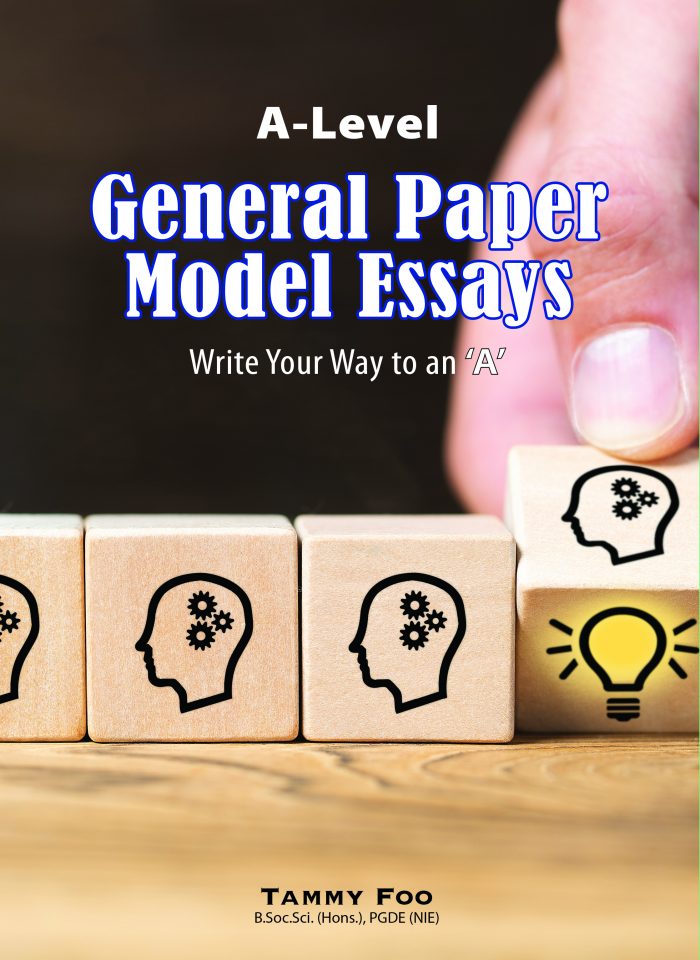Tammy Foo graduated with a Bachelor of Social Science with Honours, majoring in Political Science, from the National University of Singapore (NUS). She subsequently attained her Postgraduate Diploma in Education (PGDE) from the National Institute of Education (NIE). She has more than 10 years of experience teaching at several junior colleges in Singapore.
Tammy is the author of A-Level General Paper Model Essays – Write Your Way to an ‘A’. This book has a wide variety of questions, covering key issues on a range of topics. For each essay, examples and analysis are given so as to equip students with the ability to expand on their thesis statements and points. Students will be able to observe the style of writing of the essays and the examples given and hence use them to improve on their essay-writing. Today, Tammy shares more about excelling in General Paper.
About your book
- How will this book help students to master the A-Level General Paper effectively?
The General Paper subject is a study of the complex world that we inhabit, and aims to develop in students a keen, critical eye. This book contains comprehensive and detailed model essays covering a range of popular General Paper topics and addresses essay questions from past year exam papers, including common essay arguments that students can apply to their essays.
2. Are there certain writing styles that students should emulate?
I would not encourage a student to directly copy some other person’s writing style, as it can come out as forced and unnatural. Instead, students should attempt to develop their own style of writing. This can be accomplished through more practice. They should keep in mind that a General Paper essay should always be more formal and written clearly.
3. Are there specific examples and analyses examiners look out for?
When answering a question, students need to consider the command words. Command words may include “discuss”, “to what extent” and “examine”. They are indications of what the examiner requires in your analysis. Different command words require different approaches and analyses. Examples should be detailed and exemplify the point a student is making.
4. How well-informed should students be to do well in General Paper? Are there certain topics and issues they should pay more attention to?
Students need to possess a good grasp of current affairs. I recommend students be familiar with at least the news headlines every day. In past years, common topics and themes typically tested in General Paper essays include Arts, Science and Technology, Media, Politics, Environment, Local and Global concerns.
5. What are some common mistakes students make in General Paper essay-writing exams and how should they avoid them?
A complete A-Level GP essay should have an introduction, conclusion, 2-3 main arguments, a counterargument, and a rebuttal to the counterargument. Students often make the mistake of weakening the counterargument on purpose, thinking that this makes their argument stronger. However, a good counterargument and rebuttal are crucial. They provide nuance to a student’s essay and demonstrate that the student has a good grasp of the subject and can rationalise a variety of perspectives.
Sometimes, students do not manage their time well, leaving them with insufficient time to flesh out a proper counterargument and rebuttal. I encourage students to practise good time management during exams.
6. In addition to this book, what else can students do to prepare themselves for the A-Level General Paper?
Students need to stay up to date with current affairs and the latest world issues. They can read magazines and newspapers as well.
7. Lastly, do you have any other insights to share with parents and students about General Paper?
Like any of your other subjects, General Paper requires practice to perform well. Familiarise yourself with the different command words, and carefully consider what the question requires you to write.
About Yourself/Work/Expertise
- Why did you choose to study Political Science?
Political science is the study of government, public policies, and political behaviour. Political science uses both humanistic perspectives and scientific skills to examine countries and regions of the world.
As a political science major, I get to hone my writing, communications, analytical and many other skills that are critical to a liberal arts education. I have learnt to critically evaluate problems and solutions; develop skills in research, writing, and argumentation; acquire quantitative skills and become familiar with multiple methodologies.
2. How has General Paper evolved in the last 10 years that you have taught the subject?
In recent years, there have been an increasing number of questions that demand knowledge from more than one theme. Therefore, students need to be prepared for at least 3-4 of the themes, rather than hoping for the question to be focused on a single topic.
3. How would you motivate students who are weak in General Paper?
Students need to understand that GP is not about the ability to narrate a fictitious story. Instead, it tests your ability to think critically, reason logically, weigh competing interests and thereafter adopt a nuanced and balanced view on a particular topic of interest.
Students can gain more interest in General Paper by reading more from the following websites:
TED talks: https://www.youtube.com/user/TEDtalksDirector
The Guardian https://www.facebook.com/pg/theguardian/posts/
BBC https://www.facebook.com/pg/bbcnews/posts/
Business Insider https://www.facebook.com/pg/businessinsider/posts/
Reuters https://twitter.com/Reuters\
4. Can you share some interesting experiences while teaching?
Many of my former students like the subject so much that they end up being General Paper teachers as well. One of them even became my colleague when I was teaching at a Junior College.
5. What would you like your students to remember you for?
It is not important for my students to remember me. It is more vital for them to be able to apply their knowledge in the real world after they graduate.

